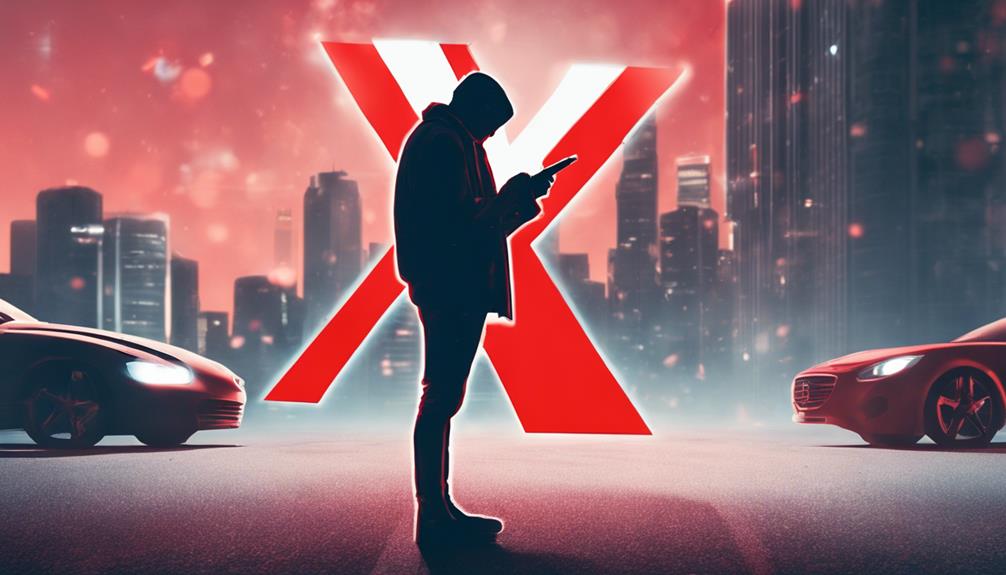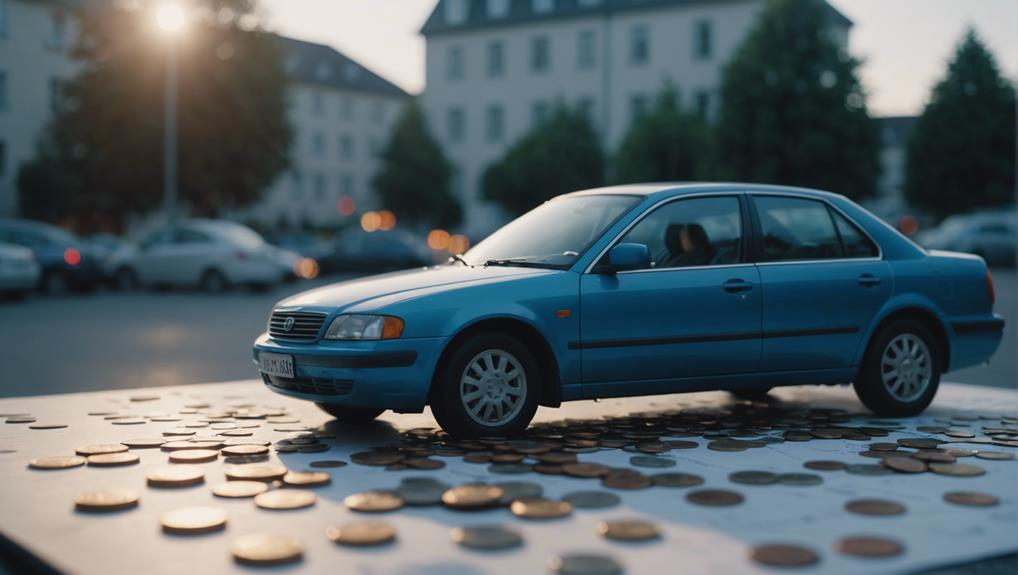When you're struggling to manage debt, filing a consumer proposal can be a lifeline, but you're likely wondering: can you keep your car? The good news is that your car isn't automatically seized or repossessed, but there are conditions to meet. To hold onto your vehicle, you'll need to keep making loan payments, maintain insurance, and prioritize maintenance to avoid added financial stress. But what if you owe more on the loan than the car is worth? How will your credit score be affected? You've got questions, and we've got answers – let's explore what happens to your car in a consumer proposal.
Key Takeaways
• Filing a consumer proposal doesn't automatically seize or repossess the car, but continuing car loan payments is necessary to keep the vehicle.
• Secured debts, like car loans, must be addressed separately from unsecured debts, and renegotiating financing options with the lender is possible.
• Prioritizing car insurance premiums, fuel, maintenance, and loan payments in the budget helps manage finances and reduces the risk of defaulting on the car loan.
• The car's value plays a significant role in determining whether it can be kept in a consumer proposal, and the trustee assesses its worth to decide how much to repay creditors.
• Working with a licensed insolvency trustee is essential to navigate the process and verify meeting requirements for keeping the car.
What Happens to Your Car
When you file a consumer proposal, your car isn't automatically seized or repossessed, but you must understand how this debt relief process affects your vehicle's ownership.
You'll need to continue making payments on your car loan to keep your vehicle, as the creditor can still repossess it if you default. However, you can negotiate with your creditor to reduce or defer payments, giving you more breathing room in your budget.
To keep your car, you'll also need to maintain car insurance, which is vital in case of accidents or other unforeseen events.
Don't forget to prioritize car maintenance, as neglecting regular servicing can lead to costly repairs down the line. By staying on top of your car's upkeep, you'll avoid additional financial burdens and maintain your vehicle in good condition.
Secured Debts and Your Vehicle
Since you're working to keep your car in a consumer proposal, it's vital to understand how secured debts, like your car loan, factor into the equation.
Secured debts are tied to specific assets, such as your vehicle, which serves as collateral. If you default on the loan, the lender can repossess the car.
In a consumer proposal, you'll need to address your secured debts separately from unsecured debts. You may be able to renegotiate the financing options with your lender or consider alternative financing options.
Your vehicle history, including the loan balance and payment schedule, will play a significant role in determining the best course of action.
It's essential to work with a licensed insolvency trustee to navigate the process and verify you're meeting the requirements for keeping your car.
They'll help you understand your obligations and create a plan to satisfy your secured debts. By doing so, you can maintain ownership of your vehicle and get back on track financially.
Unsecured Debts and Your Car
You'll also need to address unsecured debts, like credit card balances or personal loans, which can impact your ability to keep your car in a consumer proposal.
These debts can affect your financial flexibility, making it harder to manage your car loan payments and other expenses.
If you're struggling to pay off unsecured debts, it may be tempting to prioritize them over your car loan. However, doing so could put your vehicle at risk of repossession.
To avoid this, you'll need to take a closer look at the total cost of owning a car, including car insurance premiums, fuel, maintenance, and loan payments.
By factoring these expenses into your budget, you can better manage your finances and reduce the risk of defaulting on your car loan.
Value of Your Vehicle Matters
Your car's value plays a significant role in determining whether you can keep it in a consumer proposal, as the trustee will assess its worth to decide how much you'll need to repay creditors.
The trustee will consider the current market value of your vehicle, taking into account factors like car depreciation, mileage, and condition. A vehicle inspection may be required to determine its condition and estimate its value.
If your car is relatively new or has a high value, you may need to repay a larger portion of your debts to keep it. On the other hand, if your car has depreciated substantially, the trustee may consider it a lower-priority asset, and you might be able to keep it with minimal repayment.
It's crucial to understand that the trustee's goal is to guarantee fairness for all creditors, so they'll work to determine a reasonable value for your vehicle.
Creditor Approval Is Required

To keep your car in a consumer proposal, creditors must agree to the terms, which means their approval is essential to the process. You can't just assume they'll agree, though – you need to go through the proper channels to get their stamp of approval.
This involves a thorough credit check, where your credit report is scrutinized to determine your creditworthiness.
Your credit report is reviewed to assess your credit history and score.
Your income and expenses are evaluated to determine your ability to make payments.
The value of your vehicle is considered in relation to the amount you owe.
The creditors will review the proposal terms to verify they're getting a fair deal.
Negotiating With Your Creditors
After creditors scrutinize your financial situation, they'll likely want to negotiate the terms of your consumer proposal, so be prepared to discuss potential adjustments to the payment schedule or the amount you're offering to settle your debt.
This is a critical phase, as creditors will scrutinize your financial records, including credit checks, to determine your ability to repay debts. Be honest and transparent about your financial situation to build trust with your creditors.
You may need to provide additional financial information or clarify certain expenses to justify your proposed payment plan.
During negotiations, focus on finding a mutually beneficial agreement. Be open to adjusting your payment plans or debt settlements to reach a compromise.
Remember, creditors want to recover as much of their investment as possible, while you want to minimize your debt obligations. By working together, you can find a solution that works for both parties.
Keep in mind that negotiation is a give-and-take process, so be prepared to make concessions and find common ground. By doing so, you can increase the likelihood of a successful consumer proposal.
Keeping Your Car in Proposal

Maintaining possession of your vehicle is often a top priority when filing a consumer proposal, and fortunately, keeping your car is possible in most cases.
You'll need to continue making payments on your car loan and verify you have adequate Car Insurance coverage.
Additionally, regular Car Maintenance is crucial to avoid any unexpected expenses.
You'll need to keep making loan payments to avoid repossession.
You may need to renegotiate your loan terms with your lender.
You'll still be responsible for Car Insurance premiums and Car Maintenance costs.
You may need to provide proof of insurance and maintenance records to your trustee.
Exemptions and Your Vehicle
You're likely wondering how exemptions factor into keeping your car in a consumer proposal.
In Canada, exemptions vary by province, but generally, they protect certain assets from creditors.
When it comes to your vehicle, exemptions can affect whether you get to keep it. If your car is exempt, you won't have to surrender it as part of the proposal. However, you'll still need to make regular payments to maintain ownership.
Be prepared to continue paying for vehicle insurance and maintenance to keep your car in good condition.
To determine if your vehicle is exempt, consult with a licensed insolvency trustee.
They'll assess your situation and guide you through the process.
Typically, exemptions are based on the vehicle's value, with a certain amount protected.
If your car's value exceeds the exemption limit, you may need to make arrangements to pay off the excess amount or surrender the vehicle.
Understanding exemptions and their impact on your vehicle is essential in a consumer proposal.
Provincial Laws Apply Differently

Since exemptions vary by province, it's essential to understand how your province's laws affect your ability to keep your car in a consumer proposal. Provincial variations in laws and regulations can substantially impact your situation.
Understanding these regional differences is imperative to making informed decisions about your financial future.
In some provinces, like Ontario, there's a specific exemption for vehicles up to a certain value.
In other provinces, like British Columbia, the exemption is based on the equity in the vehicle, not its value.
Some provinces, like Alberta, have a minimum exemption amount for all types of property, including vehicles.
Quebec has its own unique laws and regulations regarding exemptions, which differ from the rest of Canada.
It's imperative to familiarize yourself with the specific laws in your province to determine how they'll affect your consumer proposal.
Lien on Your Vehicle Explained
When a creditor has a lien on your vehicle, it means they've a legal claim to your car, giving them the right to repossess it if you default on your loan or debt repayment.
This lien is typically registered on your Vehicle Registration, indicating that the creditor has a financial interest in your vehicle.
In the event of default, the creditor can seize your vehicle to recoup their losses.
As a result, it's vital to understand the lien on your vehicle and its implications on your financial priorities.
In a consumer proposal, the lien on your vehicle takes financial priority over other debts.
This means that the creditor with the lien has a higher claim on your vehicle than other creditors.
If you're struggling to make payments, you must address the lien on your vehicle first to avoid repossession.
Vehicle Loan and Consumer Proposal

If you're struggling to pay off your vehicle loan, a consumer proposal can help you manage your debt and protect your car from repossession. By consolidating your debts, including your vehicle loan, into a single monthly payment, you can avoid defaulting on your loan and keep your car.
Reduced monthly payments: By consolidating your debts, you can reduce your monthly payments and make them more manageable.
Protection from repossession: A consumer proposal can protect your car from being repossessed by the lender.
Lower interest rates: You may be able to negotiate lower interest rates on your vehicle loan as part of your consumer proposal.
Flexibility with Car Insurance: You may be able to adjust your car insurance premiums as part of your consumer proposal, making it easier to manage your overall debt.
Additionally, you may be able to explore loan refinancing options as part of your consumer proposal, which can help you secure a more affordable loan with a lower interest rate.
Your Credit Score and Car
Your credit score can substantially impact your ability to finance a car, and a consumer proposal can affect your credit score in the short term.
When you file a consumer proposal, it's likely that your credit score will take a hit. This can make it more challenging to secure financing for a car, as lenders often rely on credit scores to assess risk. You may still be able to get financing, but you might face higher interest rates or stricter loan terms.
Additionally, you may need to undergo more stringent credit checks, which can further impact your credit score.
It's essential to maintain good credit habits during and after your consumer proposal to improve your credit score over time.
This will increase your chances of securing better financing options for your car. In addition, having a good credit score can also lead to lower car insurance premiums, as insurance companies often consider credit scores when determining rates.
Can You Buy a New Car

Buying a new car while in a consumer proposal can be a challenging and complex process, but it's not impossible. You'll need to weigh a few factors before making a purchase.
When you're in a consumer proposal, your credit score takes a hit, making it harder to get new credit. However, it's not impossible to get approved for a car loan. You'll likely need to provide additional documentation and may face higher interest rates or stricter repayment terms.
You may need to wait until your consumer proposal is completed before applying for new credit.
You'll need to demonstrate a stable income and a manageable debt-to-income ratio.
You may need to make a larger down payment or provide additional collateral.
You should carefully review the terms and conditions of any car loan before signing.
What If You Owe on Car Loan
Owing money on a car loan while in a consumer proposal can substantially impact your financial situation and options moving forward. You might be wondering what this means for your car ownership.
If you're struggling to make payments on your car loan, you're not alone. Many people in consumer proposals face this same dilemma.
In this situation, refinancing your car loan might be an option. This involves replacing your existing loan with a new one, potentially with a lower interest rate or more manageable monthly payments.
However, refinancing may not always be possible, especially if your credit score has taken a hit due to your financial difficulties.
It's essential to consult with a licensed insolvency trustee to determine the best course of action for your specific situation.
They can help you explore loan refinancing options or negotiate with your lender to come up with a more affordable payment plan.
Long-Term Effects on Car Ownership

Entering a consumer proposal can have lasting implications for your car's future, and understanding how this decision will impact your vehicle's ownership down the road is vital. You may think you're making a temporary sacrifice, but the effects can linger long after the proposal is completed.
Key factors to ponder:
- Insurance premiums: Your insurance rates might increase due to the consumer proposal, making it more expensive to keep your car insured.
- Financial planning: You may need to adjust your budget to accommodate the changes in your financial situation, which could impact your ability to afford your car.
- Credit score: A consumer proposal can negatively affect your credit score, making it harder to secure a car loan or lease in the future.
- Long-term financial goals: You may need to reassess your financial priorities and adjust your goals, which could impact your ability to keep your car.
It's vital to weigh these factors carefully before making a decision. Remember, a consumer proposal is a significant financial step, and understanding the long-term effects on your car ownership is paramount.
Frequently Asked Questions
Can I Trade in My Car During a Consumer Proposal?
"You're wondering if you can trade in your car during a consumer proposal. Here's the deal: if you have car equity, you might be able to trade, but be aware of trade restrictions that may apply, okay?"
Will My Car Insurance Rates Increase After a Proposal?
"As you navigate the choppy waters of financial recovery, you're wondering if your car insurance rates will skyrocket after a proposal. Fear not, dear driver, your insurance premiums likely won't take a drastic hike, but policy changes might be on the horizon."
Can I Use My Car as Collateral for a New Loan?
You're wondering if you can use your car as collateral for a new loan? Well, it's possible, but be cautious – you might be limited to high-interest loan options or refinance possibilities that might not be in your best interest.
Do I Need to Disclose My Car's Value in the Proposal?
When filing a consumer proposal, you'll need to disclose your car's value, but don't worry, you might be able to protect it under vehicle exemptions. Get an accurate asset valuation to verify you're not over-exposing your ride.
Can I Give My Car Back to the Lender Instead of Paying?
Did you know 1 in 5 Canadians consider filing for insolvency due to debt? You're considering voluntary surrender – returning your car to the lender instead of paying. This may be possible through lender negotiations, but it's essential to weigh the pros and cons before making a decision.
Conclusion
You've navigated the complexities of keeping your car in a consumer proposal.
Remember, 70% of Canadians consider their vehicle essential, so it's no surprise you want to hold on to yours.
By understanding secured and unsecured debts, creditor approval, and the value of your vehicle, you're better equipped to make informed decisions.
Prioritize loan payments, insurance, and maintenance to avoid additional financial burdens.
With careful planning, you can keep your car and drive towards a debt-free future.
Stephen Johns is the founder of CarleaseCanada.ca A website that allows families to travel inexpensive or free. In 2014, when he was faced with an expense-intensive Lake Tahoe extended family reunion He embarked on his first adventure in the world of rewards on credit cards. The following summer, using a handful of carefully-planned credit card applications, he had used 15000 Ottawa Rapid Rewards points to pay for eight tickets to cross-country flights. He founded Points With a Crew to assist others to realize that due to rewards from credit cards your next family trip could be closer than they thought.









